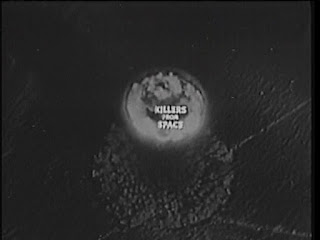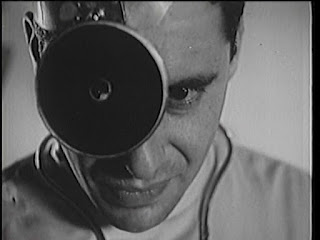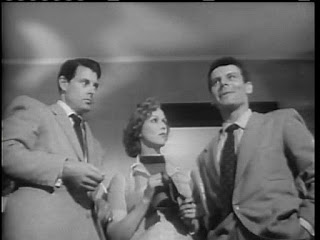It's no revelation that peplum films recycle a lot of the same props, actors, plots, and so forth. Still, it was kind of astonishing how much these two had in common -- and we're not just talking about the usual stuff, e.g.:
- the evil queen who falls in love with Hercules after he survives a test of strength;
- the soldier who reports a failed mission and is summarily executed;
- the natural disaster that overtakes the kingdom once Hercules inevitably wins.
- hidden sanctums harboring glowing objects that serve as centers of occult power and empower the evil queen -- at a severe price;
- drugged wine that Hercules is, for once (or twice!), too smart to imbibe;
- close female relatives of the evil queen whom she sacrifices to preserve her power;
- giant gongs whose beater Hercules briefly uses as a weapon;
- scenes where almost everything onscreen is blotted out by dust, wind, and storms;
- soundtracks heavy on electronic sound effects;
- ...and long strings of dialogue involving "Uranus" that, after some initial resistance, eventually had us in stitches.
[aka Maciste e la regina di Samar]
Grade: C-
This is one of those titles that immediately makes you think "camp". Hercules Against the Moon Men? How can this be anything other than a ridiculous mash-up of cheap fantasy and cheap sci-fi, a contrivance that makes Bela Lugosi Meets a Brooklyn Gorilla seem like the most natural thing in the world?
(Note: we haven't actually seen Bela Lugosi Meets a Brooklyn Gorilla, at least not yet. We're sure it's lovely.)
Well, the narration sets it up for us:
"That fatal night, a fiery mass dropped from the sky onto Earth, causing the mountain of Samar to erupt and burn everything around it, leaving nothing but a wasteland. Within the bowels of the mountain, a new and monstrous life was formed. From that day on the people of Samar, in order to survive, were forced to offer their children as a sacrifice to the hungry Mountain of Death."
Heavy duty.
From that prologue -- and ours at the start of this post -- you already know the deal, and can safely assume that evil Queen Samara (Jany Clair) is just fine with the status quo. Actually, that's not quite so: she wants to go further, and establish complete dominion over the world (the same thing we do every night, Pinky).
We find out early on that Samara is in touch with a weird alien apparition that, above all, wants her to kill Hercules (Sergio Ciani). Could this have anything to do with the mysterious mountain of death? Will Samara somehow capture Hercules and put him through a test of...?
OK, that's a yes. And will she become smitten with...?
Huh, OK, that's kinda kinky, but whatever. (Whatever she says, Jany's not done with Sergio -- and given how she guides his hands to her neck, apparently the ragdoll thing is her kink.)
And will she spike his wine with...?
...OK, then.
So it's not the basic plot of Moon Men where the interest lies, but one thing we really liked is that every time we had a suggestion for Hercules, he went and did it. For example, we asked: why bend two bars at once when you could focus on pulling one bar to the side with both hands?
"Done," says Sergio Ciani. Or, when confronted by a linebackers' wall of slow-moving golems, we said aloud "Why not just wait for an opening and dive between them?" And what do you know, the clever li'l cuss went and did that too!
One liability in Hercules Against the Moon Men is love interest Agar (Anna Maria Polani), daughter of the nobleman Gladius who was pictured a few screenshots back (and who gets Britney'd in the early going).
If you're playing the love interest of a man who can have any woman he wants, you'd better bring some serious charisma to the table. But Ms. Polani just doesn't have enough to pull it off --
-- which is a genteel way of saying that one of us was really bothered by her chin cleft, and the other wasn't exactly smitten either. Alas, we just couldn't get AMPed for this young woman.
Still, the movie hums along nicely until the final act, where the inevitable assault is mounted against the Mountain of Death -- and we suddenly get bogged down in shot after shot of windswept wastelands. The color gel lighting and dry ice fog look cool in still shots, but -- we're not exaggerating here -- ten minutes of people shouting unheard dialogue and stumbling around aimlessly? That doesn't make for an exciting climax.
Also, this is one of those movies where Hercules never seems to kill anyone. Whenever he's attacked by multiple enemies, they obligingly clasp hands with him and get thrown into the air, like some sort of pre-game ritual gone wrong.
Maybe they should just shoot him with an arrow for a change?
By the way, we liked the cool zodiac graphic that comes in about two-thirds of the way through the movie -- and we weren't above a chuckle at the line about coming under "the evil influence of Uranus". (Paging James Seay!)
One wonders why Queen Samara would take part in a plan designed to make the Earth unfit for human life. OK, "the fairest of them all" is just as applicable with a sample size of one, but then why is she devoting her energies to reviving Selene, Queen of the Moon Men? None of this really computes.
In conclusion, here's a screenshot of Sergio Ciani having a lie-down.
Speaking of which...
[aka Hercules Conquers Atlantis, Ercole alla conquista di Atlantide]
Grade: B-
"Please don't be a comedy, please don't be a comedy, please don't be a comedy," we said to ourselves as the opening minutes of Hercules and the Captive Women unspooled. After our traumatic experience with the utter garbage that was Colossus and the Amazon Queen, we simply couldn't stomach a repeat of that experience.
And disturbingly enough, the beginning of Hercules and the Captive Women bears no small resemblance to Colossus and the Amazon Queen. We've got a bar fight, followed by a betrayal from someone close to the big guy (Reg Park), who ends up unconscious aboard a ship bound for distant lands.
For all his might, Hercules spends one hell of a lot of time in this movie lying down, reclining, or otherwise in a state of repose. Whether he's listening to speeches about a mysterious threat to his homeland...
...or getting lectured by his comrade, King Androcles of Thebes (Ettore Manni)...
...or chilling out after a shipwreck...
...or hanging out with the treacherous Queen Antinea (Fay Spain)...
...or cleverly spitting out drugged wine...
...he often takes it lying down, literally.
Of course, like a male lion, he can easily rise to the occasion when necessary -- as when he drags an entire shipload of convicts back to shore after they try to strand him and Androcles on an island (once again, with echoes of Colossus and the Amazon Queen).
In fact, Androcles's expedition is astonishingly half-assed. Inflamed by a prophetic vision from the heavens -- depicted with the aid of a red filter that almost completely obliterates the onscreen visuals --
-- he goes on a voyage to confront the threat to Greece. Not only does he force Hercules to come with him, he secretly brings Hercules's son Illus (Luciano Marin), specifically against the big guy's wishes.
But Androcles seems to have no idea who or what they're looking for, or even where they're going: as far as we can tell, he just sets sail and hopes for the best.
How serendipitous that when they inevitably shipwreck, Hercules just happens to wash up on the lost continent of Atlantis -- after receiving a vision of Androcles, begging for rescue.
On arrival, Hercules discovers a young girl (Laura Efrikian) half-embedded in rock. She's midway through the process of being sacrificed to Proteus, the shape-changing protector of Atlantis.
Naturally, Hercules can't stand for this, and defeats Proteus in lizard form by ripping off his horn (which really does look rather painful).
The young girl turns out to be Ismene, daughter of Queen Antinea, and her sacrifice is meant to forestall a prophecy of the "Birnam Wood to Dunsinane" variety. In fact, Ismene seems to spend half the film getting sacrificed in one way or another.
This also explains the inclusion of Illus, as Hercules is just too old -- and too married -- to consort with this puellam nubilem. (One of us thinks she's kinda hot, the other doesn't; we can't imagine Ms. Efrikian is too heartbroken about it either way.)
You can guess much of the rest of what happens, especially if you know about the secret glowing temple of Uranus where men are transformed into mighty warriors -- or leper-like untouchables.
And speaking of Zeus's dad, this is where we really lost our shit, because once Hercules reaches his temple, the inadvertently double-entendre one-liners just kept coming nonstop:
- "Uranus! Betrayed by his own son, Uranus was struck down." (twitch)
- "Only a few drops fell on Atlantis, making us the heirs to all the powers of Uranus." (smile)
- "Now, after much searching, Antinea has found the missing secrets of Uranus." (snicker)
- "I was the last high priest dedicated to Uranus, and I still worship here at his sacred shrine." (this is about where one of us lost it)
- "Uranus was a just god, not a god of revenge!" (struggling to hold on...)
- "The blood of Uranus can never be destroyed!" (...aaaaand, now we both lost it completely)
- "Only the rays of the sun can destroy the rock of Uranus." (trying to catch our breath, you're not helping!)
Like we said before, we're twelve.
None of this makes Hercules and the Captive Women (that title is bullshit, BTW) sound like anything more than a run-of-the-mill peplum. Yet, despite the familiar themes (and poor print), this was probably the most engaging Hercules film we've seen so far. Why? Well, it's not for nothing that Arnold Schwarzenegger holds Reg Park in such high esteem: this Hercules is perfectly suited for the role.
Add to that a plot with genuine momentum (and several subplots), a solid supporting cast, and stronger-than-average production values, and we're doing well. Maybe above all, Hercules and the Captive Women maintains a balanced tone that keeps things light and brisk, with moments of seriousness and of comic relief, but never taking itself too seriously or drifting into an unfunny schtick.
And that's not easy to do in a movie that drops a pile of Uranus jokes -- or in which the ultimate adversary is an army of albino Amish clones. (Seriously.)











































































